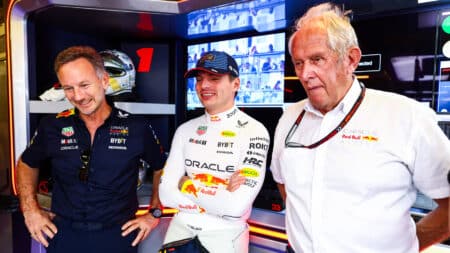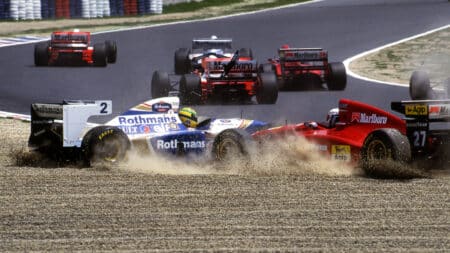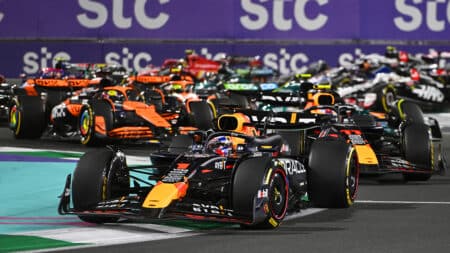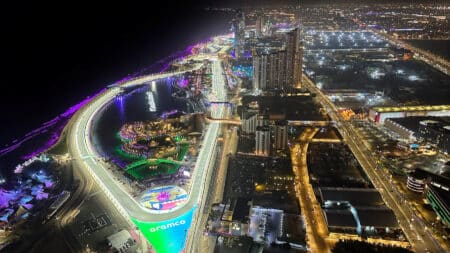
How real are Red Bull's concerns that Verstappen could leave early?
Helmut Marko caused a stir after the Bahrain GP with his worries that Max Verstappen could leave Red Bull early. But how real are those fears?
The scare stories were manifold, but it’s always best to speak as you find. Obtaining a visa for the inaugural Indian Grand Prix was a masterclass in precision – if your portrait photo didn’t measure 50mm x 50mm, you wouldn’t be travelling – but adhere to the rules and the process is passably streamlined.
You’re told that nothing can prepare you for the Indian experience, but the first things I saw upon arrival were branches of WH Smith and Costa Coffee – it appeared as much New Malden as New Delhi, but then you step outside into a world beyond compare.
The first thing is to get your head around the traffic rules, or rather their wholesale absence. Dogs, cattle and vehicles share every centimetre of every road… and all parties are liable to stray simultaneously in several different directions. If you encounter a flock of sheep being herded the wrong away along a motorway, that’s normal. It’s not particularly alarming, though, because everybody seems to understand where everybody else is going. Even the cows.
An effervescent cab ride eventually concludes by a burnt-out Peugeot 404 dumped on a large waste heap, into which assorted animals are poking their snouts. Our hotel is immediately adjacent.
The following morning brings a first daylight glimpse of India – and some uncomfortable truths. Several floors below our comfortable suite, families are washing pots, pans and children in a communal well. It’s apparent that India needs other things rather more urgently than an F1 circuit.
Buddh International is just about finished by the time the F1 community settles in, although bits of the paddock appear to have been completed in a hurry: at the top of the race control building, a set of steps leads to the lip of the roof… and thence fresh air. It’s a long way down and the structure is swiftly nicknamed the “stairway to heaven”, although a piece of tape is placed across the bottom by way of a deterrent. (This anomaly was rectified by 2012, when the pit complex acquired an extra tier.)
For all the potential foibles, though, the grey bit in the middle looks fantastic – and the drivers are swift to confirm as much (although the opening free practice session is red-flagged early, when a stray dog wanders across one of the trackside gravel traps).
Having clinched his second straight world title in Japan earlier in the month, Sebastian Vettel breezes to his 13th pole position of the season and dominates a race that’s a tame contrast to its hosting contours: there’s ample atmosphere, but little action (if you discount the latest collision between Felipe Massa and Lewis Hamilton – the Brazilian carries the can this time, even though Hamilton’s right front had struck the Ferrari’s left rear). Afterwards, driving standards advisor Johnny Herbert wrote, “The decision to penalise Massa for his contact with Hamilton came down to one thing – it could have been avoided.” Quite so, but possibly not by Massa as he was already committed to the corner when the cars touched. Jenson Button eventually takes second for McLaren, from Fernando Alonso, Mark Webber and the Mercedes-Benzes, Michael Schumacher beating team-mate Nico Rosberg.
It would be a carbon prelude for events of 2012, when Vettel again led every inch of the way. At the time of writing, no other driver has led an F1 race at Buddh.
The Indian GP isn’t a comfortable experience for visitors with a social conscience, but the nation’s warmth and hospitality are peerless. Vettel summarised it well after that first success. “At home,” he said, “we sometimes measure happiness in material terms. Here, though, it doesn’t seem to matter so much – many people own very little, but they are happy, friendly and helpful. It’s an inspiring place that opens your eyes.”
Click here for more Grand Prix coverage

Helmut Marko caused a stir after the Bahrain GP with his worries that Max Verstappen could leave Red Bull early. But how real are those fears?

Ayrton Senna’s tragic final races in 1994, marked by controversy over illegal traction control and his relentless pursuit of excellence in a challenging car, remain a poignant chapter in F1 history, as Matt Bishop recalls

Full F1 schedule for the year, including the next F1 race of 2025: the Saudi Arabian Grand Prix, the whole calendar and circuit guides for the 24-race Formula 1 season

Round five of the 2025 Formula 1 season wraps up the first triple-header of the year in Saudi Arabia. There are the dates and start time for the Jeddah event, including all sessions